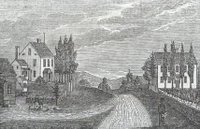 Two hundred ago, roads were chiefly lines of communication. They connected homestead with homestead, families with town and church, and towns with towns. There were no telephones, no radio, no television, no Internet, and no local newspapers. News traveled mostly by word of mouth, and mouths traveled over roads.
Two hundred ago, roads were chiefly lines of communication. They connected homestead with homestead, families with town and church, and towns with towns. There were no telephones, no radio, no television, no Internet, and no local newspapers. News traveled mostly by word of mouth, and mouths traveled over roads.In those days work kept most people at home, not away from it. The farm was their occupation and their chief source of food and clothing. Today, work is often far from home and supplies are in town or the nearby city, all reachable by highways. News, on the other hand, arrives with the flick of a switch, the opening of a mailbox, the toss of a paper carrier, or the ring of a telephone.
In many ways, a road of old was like a wire of today.




No comments:
Post a Comment